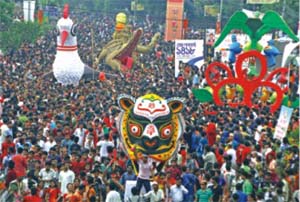 The nation celebrated the Pahela Baishakh, the first day of the Bangla calendar, on Thursday amid traditional fanfare and festivity leaving behind the gloom of past and pledging to uphold the nation’s heritage.
The nation celebrated the Pahela Baishakh, the first day of the Bangla calendar, on Thursday amid traditional fanfare and festivity leaving behind the gloom of past and pledging to uphold the nation’s heritage.
Tens of thousands of people from all walks of life dressed in traditional clothes poured into the streets, parks and open spaces across the capital and elsewhere in the country to welcome the year 1418.
Attired in traditional clothes, mostly sari and punjabi, they thronged venues of cultural programmes and makeshift fairs throughout the day.
Many expressed the determination to move forward with a vision to build a prosperous future through this year’s carnival of Pahela Baishakh with traditional songs, music, fanfares and colourful processions.
The day was a public holiday.
The biggest venue of the celebration was set at the Ramna Batamul, where programmes started with a Chhayanaut performance of Rabindranath Tagore’s song “Esho he Baishakh…”
Different cultural organisations and popular bands performed at the venue throughout the day as more people poured in.
The traditional colourful procession, known as Mongol Shobhajatra, organised by the students of the Institute of Fine Arts of Dhaka University, also began from its premises.
The Shobhajatra featuring giant replicas of tiger, cat, owl, tortoise, elephant and huge colourful masks symbolises triumph of good over evil. Tens of thousands of people joined the Shobhajatra dancing along the beats of traditional musical instruments.
Makeshift fairs, cultural performances and celebration programmes were organised by different organisations across the country.
Many ate traditional panta bhat (watered rice) with fried hilsa, lentil, green chilli and onion at home, restaurants and fairs.
The Central Shaheed Minar, Dhanmondi, and Jatiya Sangsad Bhaban areas were also seen swarmed with people since early morning till night.
No major untoward incidents were reported thanks to the tight security measures around the celebration venues.
Mughal Emperor Akbar introduced the tradition of celebrating the Bangla New Year in relation to closing of the annual tax collection. Traditionally, traders and shopkeepers open halkhata (new account register) on this day and serve sweetmeats to clients.
In the course of time, it evolved into a day of celebration and an integral part of the Bangalee culture. It is a non-communal festival as people irrespective of their religion, sect and creed celebrate the day as one nation.
The most visible aspect of the Pahela Baishakh was sprinkles of rural life that generally goes amiss in the everyday hustle and bustle of modern life.
The state-owned BTV, Bangladesh Betar (radio), and all private television channels broadcast special programmes and the newspapers brought out special supplements marking the day.
Various professional, political, social and cultural organisations also held programmes to celebrate the day.
Courtesy of The Daily Star




















